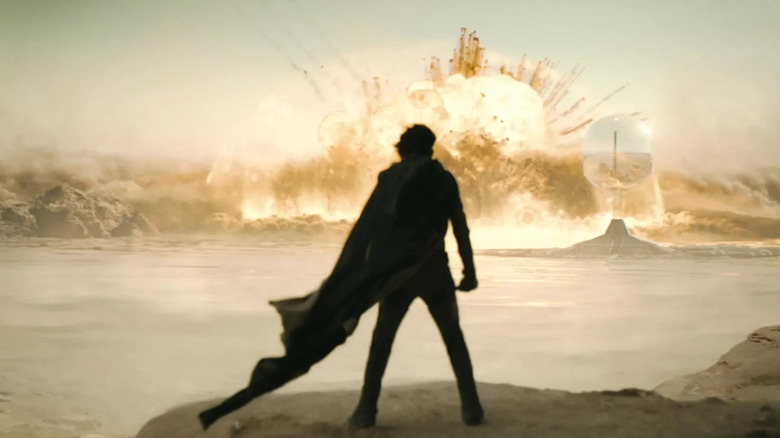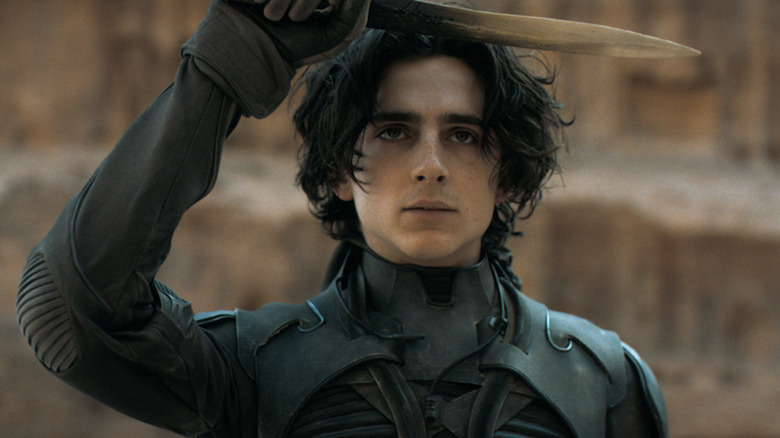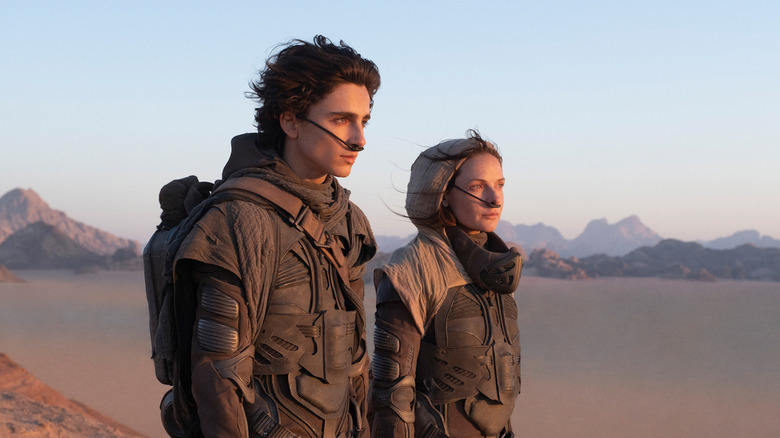It Took Years To Get The Rights For Dune, But Only 15 Minutes To Find A Director
Frank Herbert's "Dune" is an unkillable intellectual property. The novel was rejected by a multitude of publishing houses before a company best known for putting out auto-repair manuals took a chance on the sandswept sci-fi saga. Despite poor reviews and soft sales, the book caught on via word-of-mouth, spawning a series of bestselling novels that, unsurprisingly, caught the eye of Hollywood producers eager to find the next "Star Wars." They failed. Repeatedly.
Peyote Western pioneer Alejandro Jodorowsky sought to craft a mind-bending epic out of Herbert's novel, and, as recounted in the un-making-of documentary "Jodorowsky's Dune," dreamed too big. David Lynch was the next man up, and I think, as a fan of the first few books, succeeded in delivering a wildly truncated, yet generally coherent rendition of the novel on his own delectably perverse terms. Alas, critics, audiences, and most Herbert fans didn't dig it, so the property got mothballed for 15 years until the SciFi Channel greenlit a miniseries that appeased those clamoring for a superficially-faithful, sensibly budgeted adaptation and no one else.
"Dune" subsequently landed at Paramount, which, like every other studio in the 2000s, was eager to find the next "Lord of the Rings." Directors Peter Berg and Pierre Morel came and went, and the studio gradually lost interest. The adaptation rights were once again up for grabs, thus clearing the way for producers Mary Parent and Cale Boyer to pursue what had long been a dream project for them. For several years, they had nothing more than the fantasy of succeeding where so many others had failed. Then, in a rare instance of Hollywood kismet, everything clicked into place, and, two years after signing a tremendously game Denis Villeneuve to direct, they were making a movie that, to date, seemed unmakable.
The dangerous, potentially disastrous dream of Dune
In Tanya Lapointe's behind-the-scenes book "The Art and Soul of 'Dune'," Parent discussed her passion for Herbert's novel, which, for her, is every bit as relevant today as it was when it was first published in 1965. According to Parent:
"Thematically, it describes challenges we are currently facing as a society with an ecologically bankrupt world, corruption, and shifting political sands. At the center of these themes is the coming-of-age story of a young man trying to navigate our new world."
So, when the rights became available in 2012, Parent and Boyer began talking with Frank Herbert's estate, which is managed by his son Brian. The duo kept this line of communication open for four years, but they were hampered by their lack of studio backing. This changed in 2016 when they accepted leadership deals at Legendary Entertainment. Though they now had decent leverage, they were still facing stiff competition from other studios that were also undeterred by the material's checkered production history. Hollywood still wanted to play in Herbert's sandbox of desert warfare and Machiavellian political intrigue.
Determined to get the inside track, Parent and Boyer took instant notice when Academy Award-nominated filmmaker Denis Villenueve revealed to Variety in September 2016 that "Dune" was a dream project for him as well. Based on his emotionally and intellectually stirring sci-fi of "Arrival," the producers privately considered him their first choice to at long last do big-screen justice to Herbert's novel. But they didn't want to contact him until they secured the rights they'd been chasing for four years. To their delighted shock, they didn't have to wait long to get in a room with Villenueve.
The negotiations were brief
After a series of positive interactions with the Herbert estate from their perch at Legendary Pictures, Parent and Boyer finally optioned the adaptation rights in November 2016. The deal hinged on Legendary agreeing to the estate's demands that they proceed with, in the words of Brian Herbert, "the demands of discriminating 'Dune' fans" ever in mind. This wasn't a problem for the producers, but what about Villenueve?
If they were at all apprehensive about the visionary filmmaker pushing back on the Herbert estate's concerns, those fears were quickly allayed when they met with Villenueve a week after closing their rights deal.
According to Parent, Villenueve was overwhelmed to be in consideration to direct one of his favorite books. "He got emotional saying he couldn't believe he was sitting there," she said. "We couldn't believe it either." Their negotiation was brief. "It took years to get the rights, then fifteen minutes to get the director," said Parent. "That's never happened before."
Though the releases of "Dune" and "Dune: Part Two" were complicated by the ongoing Covid pandemic and the WGA/SAG-AFTRA strikes of 2023, they hit the sweet spot with fans, critics and mainstream moviegoers. The first film was nominated for 10 Academy Awards and won six, while the sequel is expected to be a major contender throughout the 2024 awards season. It might've taken six decades and numerous missteps, but Hollywood's belief in the feature potential of "Dune" was ultimately justified.


